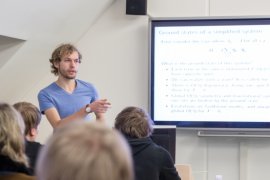Quality assurance and evaluation of education
Quality assurance at Utrecht University is organised at a number of different levels.
Internally, the Executive Board, deans, lecturers and students address the quality of education in various contexts. In addition, all programmes are also assessed externally by an external assessment panel. The Executive Board also periodically measures the results of the education with various instruments, such as degree-programme reviews, enquiries among students, alumni and staff members and quantitative data on intake, progress and outflow.
The Executive Board assesses every new degree programme in its planning stage. Once approved, the programmes are included in the University Register of Programmes (in Dutch: Universitair Register van Opleidingen, URO), which is a prerequisite for registration in the Central Register of Higher Education Programmes (in Dutch: Centraal Register Opleidingen Hoger Onderwijs, CROHO).
Degree Programme Advisory Committee
Each programme has its own Degree Programme Advisory Committee. Based on the results of the programme evaluations, among other things, the Degree Programme Advisory Committee advises on the quality of education, addresses any bottlenecks and gives advice on the development and implementation of educational policy. A Degree Programme Advisory Committee is made up of both students and lecturers.
Board of Examiners
A Board of Examiners consists of the academic staff members who teach the programme. The Board has a statutory duty to monitor the quality of degree certificates, examinations and other forms of testing. The Board of Examiners sets up guidelines for the assessment and determination of the results and assesses applications for electives and exemptions. The Board of Examiners is required to draw up an annual report. This contains recommendations that must subsequently be included in the internal quality assurance process of the programme.
Employee and student representation
The students are the customers of our education. More than anyone else, they are aware of the criteria that good education needs to meet. In each organisational layer of Utrecht University, students and employees provide input regarding university policy, give advice on how to improve the quality of education and research and help decide how the internal quality assurance system should be organised. This representation occurs through the University Council at the university level, through the Faculty Councils at the faculty level and through the Degree Programme Advisory Committees at the programme level.
The Student Representation of the University Council 2014-2015 has written an advisory report (pdf) on student involvement at Utrecht University.
An external assessment committee of (inter)national experts and students assesses all degree programmes once every six years Subsequently, the Accreditation Organisation of the Netherlands and Flanders (in Dutch: Nederlands-Vlaamse Accreditatie Organisatie, NVAO) accredits all Bachelor's programmes and Master’s programmes of Utrecht University
Intake
For incoming students, it is important to know who they are and why they have chosen a particular programme at Utrecht University. This is studied through matching tracks.
Progress
Opinion and experiences of current students regarding the education and facilities are gathered via the National Student Survey (in Dutch: Nationale Studenten Enquête). The university also organises its own surveys, such as one-time enquiries or focus-group studies.
In addition to the university-wide studies, the faculties and/or programmes also conduct their own studies. The most important of these are the course and curriculum evaluations.
Outflow
To find out the opinions of alumni, Utrecht University participates in the biennial National Higher Educational Monitor (in Dutch: WO-monitor). The University also organises a survey among students who leave the University without obtaining a degree.




